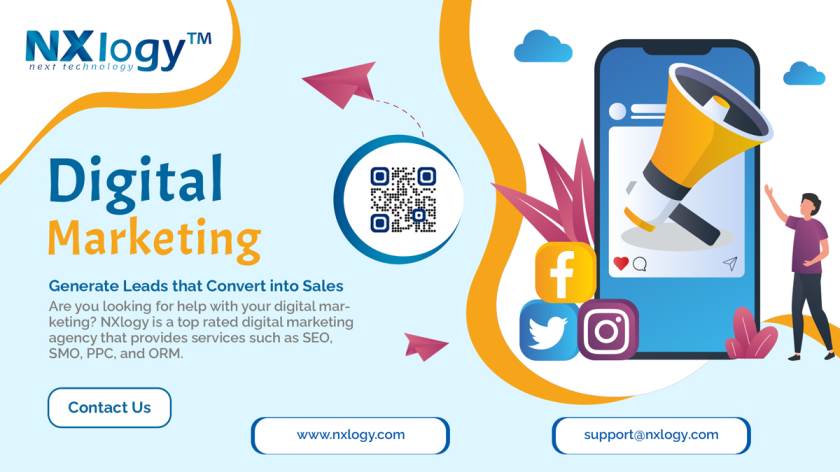In today’s digital age, digital marketing has shifted from traditional methods to online platforms. Digital marketing has become an essential tool for businesses looking to expand their reach, engage with customers, and boost their overall success.
1. Wider Reach & Global Exposure
One of the most significant advantages of digital marketing is its ability to reach a global audience. Unlike traditional marketing methods, which are often limited to a specific geographic region, digital marketing allows businesses to expand their reach to potential customers around the world. With the internet accessible across various devices, including smartphones, tablets, and desktops, businesses can tap into a vast pool of potential customers.
For example, through social media marketing, businesses can engage with people from different countries and regions, expanding their brand’s awareness on a global scale. This increased exposure can lead to new markets and opportunities, allowing businesses to grow beyond local boundaries.
2. Cost-Effectiveness
Digital marketing is much more cost-effective than traditional marketing methods like TV commercials, radio ads, or print media. Small and medium-sized businesses, in particular, benefit from the lower costs associated with digital advertising. Channels such as social media platforms, pay-per-click (PPC) advertising, and content marketing often require lower budgets and can deliver substantial results.
For instance, a business can run targeted Facebook or Google ads that reach a specific audience without breaking the bank. With the ability to set flexible budgets and bid strategies, businesses can maximize their marketing investment and achieve a higher return on investment (ROI).
3. Targeted Audience
One of the most powerful aspects of digital marketing is the ability to target specific audiences. Digital platforms allow businesses to use various metrics and filters to focus on the demographics, behaviors, and interests of their ideal customers. Whether through email marketing, social media ads, or search engine optimization (SEO), businesses can direct their efforts toward the right people.
This level of targeting ensures that marketing efforts are more efficient and relevant. For example, a business selling beauty products can target ads to individuals who have shown an interest in skincare and cosmetics, improving the chances of engagement and conversions.
4. Measurable Results
Unlike traditional marketing, where it’s often difficult to measure the effectiveness of a campaign, digital marketing provides real-time data and analytics. Businesses can track the performance of their campaigns across various channels using tools such as Google Analytics, Facebook Insights, and other analytics platforms.
These insights allow businesses to see which strategies are working, which ones need improvement, and how customers are engaging with their content. Being able to measure metrics such as website traffic, conversion rates, and click-through rates (CTR) helps businesses make informed decisions and optimize their campaigns for better results.
5. Improved Customer Engagement
Digital marketing opens up a two-way communication channel between businesses and their customers. Through platforms like social media, businesses can directly interact with their audience, respond to comments, answer questions, and address concerns in real-time. This type of engagement fosters trust and builds stronger relationships with customers.
Moreover, digital marketing allows for personalized marketing efforts. Through targeted emails, personalized recommendations, and retargeting ads, businesses can tailor their messages to suit individual customers, enhancing their overall experience and increasing the likelihood of repeat business.
6. Better Conversion Rates
Digital marketing strategies, especially those focused on targeted advertising and SEO, tend to lead to higher conversion rates. When businesses connect with the right audience at the right time, the likelihood of converting leads into customers increases significantly. This is particularly true for well-optimized websites that are user-friendly and designed to convert visitors into paying customers.
For instance, an eCommerce store can use digital marketing to guide potential buyers through the sales funnel by providing relevant content, personalized offers, and seamless checkout processes. Additionally, retargeting strategies help recapture the attention of users who may have visited a website but didn’t make a purchase, further improving conversion rates.
Conclusion
Digital marketing has revolutionized the way businesses connect with their audience and achieve their goals. The ability to reach a wider audience, engage with customers, measure results, and adapt strategies on the fly makes digital marketing a powerful tool for businesses of all sizes. From cost-effectiveness to improved conversion rates, the benefits of digital marketing are numerous and can significantly impact a business’s growth and success. Embracing digital marketing allows businesses to stay competitive in a rapidly evolving digital landscape, providing them with the opportunity to expand, innovate, and thrive.



